
Portrait in Jazz is the fifth studio album by American jazz pianist Bill Evans as a leader, released in 1960. It is the first of only two studio albums to be recorded with his famous trio featuring bassist Scott LaFaro and drummer Paul Motian.

Explorations is an album by jazz pianist Bill Evans that was originally released by Riverside Records in 1961. It was the second and final studio album Evans recorded with his classic trio featuring Scott LaFaro on bass and Paul Motian on drums.

Sunday at the Village Vanguard is a live album by jazz pianist and composer Bill Evans and his Trio consisting of Evans, bassist Scott LaFaro, and drummer Paul Motian. Released in 1961, the album is routinely ranked as one of the best live jazz recordings of all time.
Riverside Records was an American jazz record company and label. Founded by Orrin Keepnews and Bill Grauer, Jr, under his firm Bill Grauer Productions in 1953, the label played an important role in the jazz record industry for a decade. Riverside headquarters were located in New York City, at 553 West 51st Street.

Monk's Music is a jazz album by the Thelonious Monk Septet, which for this recording included Coleman Hawkins and John Coltrane. It was recorded in New York City on June 26, 1957, and released in November the same year.

The Incredible Jazz Guitar of Wes Montgomery is an album by the American jazz guitarist Wes Montgomery. Most of its tracks exemplify two of Montgomery's distinguishing techniques: "thumb picking" and the use of octaves.
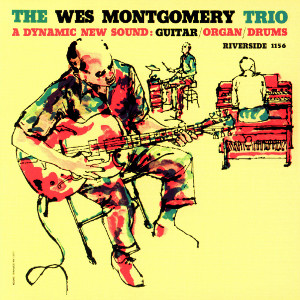
The Wes Montgomery Trio is an album by the American jazz guitarist Wes Montgomery, released in 1960. The track "Missile Blues" is named after the club in Indianapolis where Montgomery played before moving to New York City to record for Riverside. At this club, he met Riverside's record producer Orrin Keepnews. The album was reissued on the Original Jazz Classics label.

Orrin Keepnews was an American jazz writer and record producer known for founding Riverside Records and Milestone Records, for freelance work, and for his work at other labels.

At Newport 1960 is a live album by Muddy Waters recorded during his performance at the Newport Jazz Festival on July 3, 1960. With his longtime backup band, Muddy Waters plays a mix of his older popular tunes and some newer compositions. Chess Records released the album in the United States on November 15, 1960.

The Healer is a blues album by John Lee Hooker, released in 1989 by Chameleon. The album features collaborations with Bonnie Raitt, Charlie Musselwhite, Los Lobos and Carlos Santana, among others. The album was a critical and commercial success and was important for Hooker's later career.

Coltrane Jazz is a studio album by the jazz musician John Coltrane. It was released in early 1961 on Atlantic Records. Most of the album features Coltrane playing with his former Miles Davis bandmates, pianist Wynton Kelly, bassist Paul Chambers and drummer Jimmy Cobb during two sessions in November and December, 1959. The exception is the track "Village Blues", which was recorded October 21, 1960. "Village Blues" comes from the first recording session featuring Coltrane playing with pianist McCoy Tyner and drummer Elvin Jones, who toured and recorded with Coltrane as part of his celebrated "classic quartet" from 1960 to 1965.
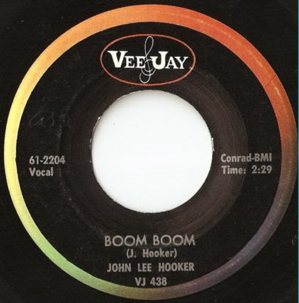
"Boom Boom" is a song written by American blues singer and guitarist John Lee Hooker and recorded October 26, 1961. Although it became a blues standard, music critic Charles Shaar Murray calls it "the greatest pop song he ever wrote". "Boom Boom" was both an American R&B and pop chart success in 1962 and a UK top-twenty hit in 1992.
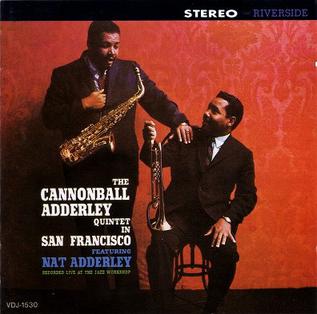
The Cannonball Adderley Quintet in San Francisco is a 1959 album by The Cannonball Adderley Quintet.

The Complete Riverside Recordings is a box set of American jazz guitarist Wes Montgomery's early recordings on the Riverside label. It is a twelve-CD box set and was released in 1992. It contains 157 songs and includes 15 previously unissued performances, six re-edited versions of previously issued numbers and 29 alternate takes. The extensive liner notes by producer Orrin Keepnews and Jim Ferguson, session notes, and photographs. Keepnews and Ferguson received a Grammy Award nomination for Best Album Notes.

Ugetsu: Art Blakey's Jazz Messengers at Birdland is a live jazz album by Art Blakey and the Jazz Messengers released on Riverside Records in October 1963. The album was recorded at Birdland in New York City.
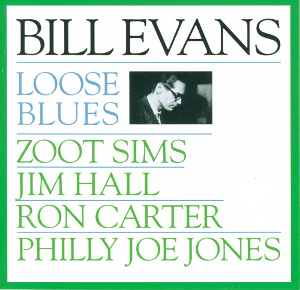
Loose Blues is an album by jazz pianist Bill Evans released on the Milestone label, featuring performances by Evans with Zoot Sims, Jim Hall, Ron Carter, and Philly Joe Jones, recorded in 1962.
John Lee Hooker was an American blues singer and guitarist who recorded from 1948 to 2001. His discography includes recordings issued by various record companies in different formats.
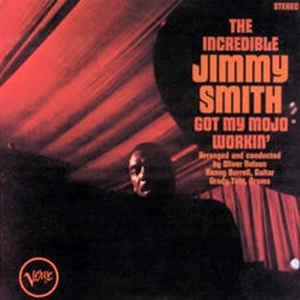
Got My Mojo Workin' is a 1966 album by Jimmy Smith arranged by Oliver Nelson.

The Folk Lore of John Lee Hooker is an album by blues musician John Lee Hooker, released by Vee-Jay Records in August or September 1961. Hooker recorded most of the songs on January 4, 1961, in Chicago, with two recorded live at the Newport Folk Festival June 25, 1960.

Gemini is an album by American jazz guitarist and flutist Les Spann released in 1961. It is Spann's only studio album as a leader, recorded when he was playing as a sideman with Dizzy Gillespie's quintet and Quincy Jones' big band. The title of the album corresponds to Spann's zodiac sign, born on May 23, 1932. For this work Spann led a quintet formed by Julius Watkins, Tommy Flanagan (piano), Sam Jones and two drummers sharing the two recording dates, Albert "Tootie" Heath and Louis Hayes.


















